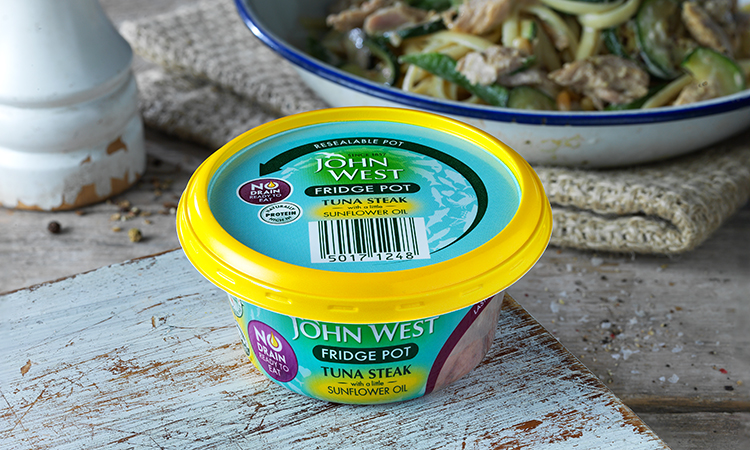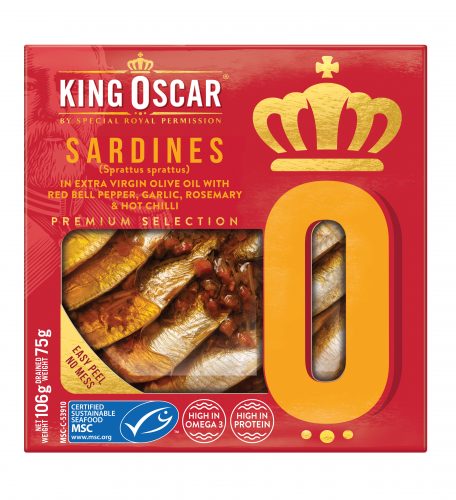Making natural protein easy
- Like
- Digg
- Del
- Tumblr
- VKontakte
- Buffer
- Love This
- Odnoklassniki
- Meneame
- Blogger
- Amazon
- Yahoo Mail
- Gmail
- AOL
- Newsvine
- HackerNews
- Evernote
- MySpace
- Mail.ru
- Viadeo
- Line
- Comments
- Yummly
- SMS
- Viber
- Telegram
- Subscribe
- Skype
- Facebook Messenger
- Kakao
- LiveJournal
- Yammer
- Edgar
- Fintel
- Mix
- Instapaper
- Copy Link
Posted: 3 May 2021 | Jon Burton | No comments yet
Addressing the change in consumer demand, this article outlines why natural protein is the easy solution that meets our need to combine health, nutrition, convenience and sustainability in a single bite.


John West is attempting to bring convenience and nutrition with its new range of pots
Nutrition is taking more of a front seat as many people are tiring of expensive diets and ‘gimmicky supplements’ that promise big results but don’t deliver. Instead, people are tending to favour a more balanced approach to health.
This new, holistic approach to health is transforming the food market, and as it continues to evolve, there is a higher growth demand for consumers seeking natural nutritious foods that fit in with a lifestyle focused on general wellbeing.
COVID-19 changed attitudes towards health
This new outlook has been further enhanced by authorities like the World Health Organization, which confirmed that a healthy diet plays a major role in fighting off coronavirus. The lockdown periods during the pandemic have also created change in people’s priorities, placing physical and mental health at the forefront of our minds.
Almost half (49 percent) of consumers said that being in good health is more important now as a result of COVID-19. This is according to a recent EIT Food report published in December 2020, which surveyed 5,000 consumers in 10 European countries.
This has brought about a demand for products that can not only support a healthy immune system but also mental wellbeing.
Convenience and sustainability are big priorities
As well as this higher demand for healthier food options, consumer behaviours are also moving rapidly towards more convenient and sustainable choices.
The sustainability drive can be partially satisfied by product origin labelling on food packaging, which has been in place for some time now across Europe.
However, increased demand and growing climate concerns have recently led the European Commission to take this one step further. As part of the European Green Deal’s Farm to Fork (F2F) strategy, mandatory origin labelling for a greater range of products is set to be in place by Q4 2022.
Moreover, according to the Global Convenience Foods Market 2020, we are seeing a higher rise in health convenience foods that contain proteins, vitamins, omega-3 fatty acids and functional fibres. The desire for convenience is also being driven by the demand for quick and easy dinner‑time solutions, as proven by the increase in sales of meal kits and recipe boxes for home use. With companies like HelloFresh and Gousto delivering the exact ingredients straight to your front door, consumers are being provided with both convenient and nutritious options for their meals, making cooking easier than ever before.
Clearly, then, we are beginning to see changes at both consumer and broader policy and business levels start to take effect in terms of food purchasing and consumption.
Fish is the answer to today’s consumer demand
All in all, people’s diets now have a greater focus on being functional and easy to accommodate into everyday life; all driven by the need to optimise overall wellness. One of the most viable solutions, as we see it, is to look at natural protein food options.
Fish is a food group that is full of natural protein, as well as healthy fats and important nutrients. In accordance with NHS advice, a healthy, balanced diet should include at least two portions of fish a week, including one oily fish – such as salmon and sardines – which are high in long-chain omega-3 fatty acids and widely known to be essential in keeping your heart healthy.
Omega-3 is also extremely beneficial for brain and eye health – it is, in fact, integral to organ functions. Omega-3 is made up of long-chain fatty acids ALA, EPA and DHA, with DHA making up around 40 percent of the polyunsaturated fats in our brains, and 60 percent of the polyunsaturated fats in our retinas.
With fish being one of the main – and most satisfying – food sources of Omega-3 (others being walnuts, pumpkin seeds and edamame beans, for example), it clearly ticks many boxes on both the health and taste satisfaction fronts.
The common barriers that natural protein presents
Despite numerous health benefits, fish is still not seen as a regular family favourite at mealtimes. Everyday fish products, especially tuna, are considered a mere store cupboard staple, which once in place is often forgotten, only being used as an emergency fallback rather than an everyday ingredient.
In addition, many also forget the importance of consuming protein regularly to maintain a well‑balanced diet. Western diets are often too high in carbohydrates or fat, and our evening meals can be far too protein-heavy; instead, it is better to spread protein intake throughout the day and think of ways to incorporate protein into our breakfasts and lunches as well as dinners.


The new King Oscar line is bringing new flavours to the sardine market
So, along with the rising consumer demands to develop healthier habits and consume food in more sustainable ways, while satisfying our desires for quick and convenient options, it’s clear that the food industry still needs to think about how best to encourage a much-needed change in our consumption habits.
The brand gap for natural protein product demand? Making fish delicious, not just nutritious
Our own research has also shown that consumers – and younger shoppers in particular – are increasingly looking for tasty, fresh and high-quality convenience products that fit into a busy lifestyle. In fact, our findings further revealed that people would eat fish more often if others in the household would eat it too.
Furthermore, shoppers often see fish as an expensive item, and so consequently only buy small quantities. As a result, it’s clear that fish can often be overlooked, despite its enormous health benefits, which is where we see the gap that John West can fill.
For this reason, John West launched the No Drain Fridge Pot alongside its canned products to help consumers incorporate more fish into their diets and give them greater choice of this affordable and versatile source of protein. Our Tuna and recently launched Salmon Fridge Pots offer consumers a quick and convenient mealtime solution that could be a simple lunchtime meal option, or an easy-to-make dinner. With our Salmon Fridge Pots offering consumers 24g of protein per 100g and our Tuna Fridge Pots 29g of protein per 100g, both products are naturally high in protein.
We have also extended our natural protein offer into easy light meals by means of our Tuna Bowls and Bites range.
The Tuna Bowls aim to provide a convenient, light meal aimed at health‑conscious consumers leading fast-paced lives, while our Tuna Bites is a range specifically developed for children. With both products created in a variety of sauces and vegetables with either pasta, beans or rice, these fast, on-the-go options certainly meet the demand to make fish a tasty and easy choice for everyone.
But it’s not just about tuna. Our recently launched King Oscar range is putting sardines – another excellent source of natural protein – right at the forefront of people’s minds. Our range helps to make sardines more appealing to the modern shopper with new and exciting flavours; our sustainably wild-caught Brisling sardines are canned in extra virgin olive oil, which come in three variants: Red Bell Pepper, Garlic, Rosemary and Hot Chilli; Sliced Spanish Manzanilla Olives; and Basil, Oregano and Garlic.
Natural protein really can be easy
We know there is consumer demand to make more healthy life choices when it comes to food – and these need to be both convenient and sustainably sourced. Natural protein ticks the healthy diet box, and the additional convenience and sustainability requirements put fish right at the top of the agenda.
For this reason, at John West, we are continuing to innovate our products with the aim of prioritising naturally healthy and protein-rich products as a staple in people’s diets.
Our different ranges cater to all ages and differing mealtime requirements, and our varied flavours and recipes bring innovation to the fish category, helping to drive our mission of putting natural protein top of the agenda for a healthy, balanced diet.
About the author
Jon Burton
Jon is International Marketing Director for John West and has strategic responsibility for the brand in the UK and Europe, within its parent company Thai Union. Jon has additional responsibility for the brand’s sustainability and innovation strategies, working directly with Thai Union’s Global Innovation Center and Global Sustainability Team in Bangkok.
Related topics
COVID-19, Environment, Fats & oils, Health & Nutrition, Product Development, Proteins & alternative proteins, retail, Supermarket, Sustainability, The consumer
Related organisations
European Commission (EC), European Institute of Innovation & Technology (EIT Food), Global Convenience Foods Market, John West, NHS, The World Heath Organization (WHO)








